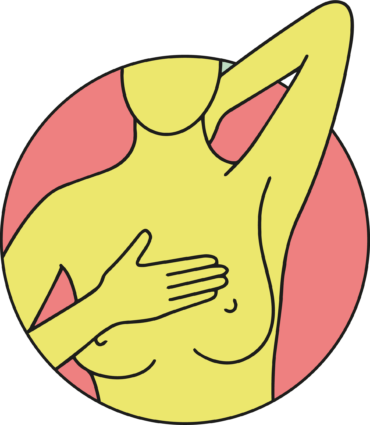1. less is more
The idea that you have to use as much soap as possible to be "clean" is a persistent one. From various intimate care products and washing lotions to intimate deodorants, you can find virtually everything your genitalsThis is the medical term for sexual organs. This refers to both the internal and external sexual organs. The external genitalia penis, scrotum and testicles are referred to as male genitalia. The vulva is referred to as the female genitalia... could possibly desire in drugstores. Stop! Let me tell you right now: your vulva/vagina or penis don't need much to be clean. However, there are a few things to bear in mind - and also differences in care.
The right care can protect you from fungi and bacteria or ensure that the "good" bacteria are preserved. What this means exactly is explained again in point 2.
Our skin has a certain pH value, which is around 5. This means that the skin is slightly acidic - most shower gels and soaps are adjusted to this pH value so as not to damage the skin.
However, the vaginal intimate area is in a different, even more acidic environment, which means that most people with vaginas have a pH value of around 3.8-4.5 from pubertyPuberty is the period when children grow into adults. Puberty involves many physical and emotional changes and is a very challenging time. onwards. Regular soap would attack this pH value, which has a special protective function.
2. different bodies need different things
But how exactly does the washing process work?
The penis and vulva/vagina feel most comfortable when they can remain in their acidic environment.
Vagina
In contrast to the penis, the vagina has a "self-cleaning function". Its acidic environment ensures that the good bacteria stay inside and bad bacteria can't get in. The purpose of this is to prevent infectionsHaving an infection or being infected means that you have contracted a pathogen. This can be a flu, herpes or HI virus, for example.. Pretty practical, isn't it?
However, if this environment, the vaginal floraObsolete for vaginal flora, is disturbed, i.e. the good bacteria are destroyed, there is more of a target for bad bacteria and therefore infections or fungi. This happens through shower gel and soap, among other things.
As I said: the vaginaobsolete word for vagina. (i.e. what's inside) cleans itself, you should only wash your vulva with your hand and water, that's all it needs.
Pull your outer vulval lips apart a little to remove sweat residue and the like. It is quite normal for "whitish stuff" to accumulate throughout the day.
Avoid both washcloths and holding the shower jet directly onto your vulva or vaginal entrance, as this can also destroy the good bacteria.
You can support the acidic environment of your vagina by wearing cotton underwear, practicing safe sexSex is an intimate activity between two or more people who share physical closeness. Sex can be practiced in different ways, depending on the preferences and desires of the people involved. The only rule that always applies: sex without mut... (more on this below), changing your towels regularly and washing your underwear hot enough.
penis
With the penis, on the other hand, you need to pay a little more attention to cleaning. Although you should avoid aggressive soaps here too, it is advisable to actively wash it every day as the penis glansRefers to the slightly thickened, front end of the penis with the mouth of the urethra as well as the front, visible end of the clitoris. The glans swells during sexual arousal and is often the most sensitive part of the external genitals. ... does not have a self-cleaning function.
To do this, pull down the foreskin (if present) and use warm water to wash the glans. Here too: so-called "smegma" forms, a whitish substance consisting of sebum, skin flakes, urine and sweat residue, which is completely normal and can usually be easily washed off.
Cleaning your genitalsThis is the medical term for sexual organs. This refers to both the internal and external sexual organs. The external genitalia penis, scrotum and testicles are referred to as male genitalia. The vulva is referred to as the female genitalia... every day is just as important as washing under your arms or around your anusAnus (also called anus) refers to the exit opening of the large intestine. Colloquially also called "asshole"..


3. if something is wrong, have it checked
If you feel itchy or burning, or your vulva or penis is red, swollen or you have an odorous dischargeDischarge is always a sign that something is wrong. However, various fluids and secretions come out of the vagina from different glands. A clear or white to yellowish fluid, known as cervical mucus, tells you where you are in your cycle, fo..., this may indicate bacterial vaginosis, a fungal infectionHaving an infection or being infected means that you have contracted a pathogen. This can be a flu, herpes or HI virus, for example. or another STISTI is the abbreviation for "sexually transmitted infections". Sometimes only the abbreviation STI is used in specialist circles or in brochures.. It helps to get this checked out medically so that you can start the right treatment.
The majority of people with a vagina contract a vaginal fungus or bacterial vaginosis at least once in their lives, many of them even more often. So it happens much more often than you might think. What sounds pretty unpleasant at first is actually much more common - it's just that people don't talk about it very much.
However, it can still be unpleasant, because itching and burning or redness in the genitalThis is the medical term for sexual organs. This refers to both the internal and external sexual organs. The external genitalia penis, scrotum and testicles are referred to as male genitalia. The vulva is referred to as the female genitalia... area are not necessarily symptoms that give pleasure.
Fortunately, treatment is simple and both vaginal yeast infections (caused by yeast fungi) and bacterial vaginosis (caused by bacteria) can be treated quickly and easily. Bacteria and fungi can also be transmitted to other people, including people with a penis, so it is sometimes advisable for sexual partners to treat themselves too.
Fungal infections are triggered by various factors such as stress, incorrect cleaning or even certain diets. They can be recurring, but as described above, there are a few things you can do to prevent them.
4. caution is also required during sex
Your intimate flora can also be disturbed by frequently changing sexual partners. This is not to say that you can't go wild, but simply that safer sexSafer Sex ist Sex bei dem geeignete Massnahmen ergriffen werden, um ungewollte Schwangerschaft und/oder sexuell übertragbare Infektionen (STIs) zu vermeiden. Dazu gehört beispielsweise das Verwenden von Kondomen, Lecktücher und Latexhand... is part of it. You can prevent this by using a condomAuch Präservativ genannt. Ein Kondom ist eine schlauchförmige Gummihülle, die über den Penis gestreift wird, um während des Geschlechtsverkehrs eine Barriere zu bilden und so eine Schwangerschaft und/oder die Übertragung von sexuell ... and/or a lick cloth, but washing your hands and toys before sexual interaction (even before solo sex!) also minimizes the risk of transmitting bacteria and fungi.
By the way: Sex toysThis includes all objects that can be used alone or with others to give pleasure and/or sexual satisfaction, such as vibrators, pleasure balls, cock rings, sex dolls, masturbators, dildos, vaginal replicas, whips, paddles, swings and many m... are best cleaned with warm water and mild soap. Occasionally you can also use special toyEnglish word for sex toys, includes e.g. dildos, vibrators, love balls, rings and much more. cleaners, but these are no substitute for cleaning with hot water. You should refrain from using aggressive products such as disinfectants or similar, as this can damage the toys in the long term and is also not healthy for your intimate area.
As mentioned above, fungi and bacterial infections can also be transmitted to sexual partners. You should therefore be particularly careful during sex if you already know that you have an infection. Talk to your sexual partners about it and discuss how you can minimize the risk of transmission. Going to the toilet after (solo) sex can also be a preventative measure. This flushes the bacteria directly out of the urethraUrine from the bladder is excreted from the body via the urethra. In the vulva, the urinary outlet is located between the clitoral pearl and the vaginal entrance. In the penis, the urethra leads through the penis to the tip of the glans..
5. intimate hair is nothing unhygienic
Intimate hair is a natural part of the human body and is not unhygienic in itself. Every person can decide for themselves how and where they want to wear intimate hair without being judged by others. There are different cultural and individual preferences regarding intimate hair and it is important to respect this diversity.
There is no medical necessity to remove intimate hair. On the contrary. From a medical point of view, it is advisable to leave intimate hair in place, as it serves to protect the sensitive skin in the intimate area. The presence of intimate hair can help to protect the skin from friction, chafing and possible infections.
If you decide to remove intimate hair, it is important to do so with care. Shaving your intimate area can lead to skin irritation, ingrown hairs and even injury if you shave wet. You should make sure you use sharp and clean razor blades and prepare the skin well. This is less problematic with an electric trimmer. But be careful, only use trimmers specially designed for this purpose. The ones for head hair are far too coarse and can cause nasty injuries to the vulval lipsThe vulval lips, also known as labia, are the folds of skin in front of the vaginal opening and are part of the vulva. A distinction is made between the outer and inner vulval lips. The vulval lips look different in everyone. In some, the i... or scrotumThe scrotum is a bit like a pouch that surrounds and protects the testicles. It can also contract and collapse to ensure the optimum temperature for spermatogenesis of 34.5°C. If it is too cold, the scrotum contracts so that the testicles ....
6. wet is not always cool
Prolonged moisture in the intimate area, e.g. in the underpants, can lead to various problems. A moist environment favors the growth of yeasts and can lead to vaginal fungal infections. It can also lead to an imbalance in the natural bacterial flora in the intimate area, which favors bacterial infections such as bacterial vaginosis (see point 3). In addition, excessive moisture can lead to unpleasant odors, as bacteria and fungi grow in a moist environment.
There are a few measures you can take to avoid moisture in the genital area. After washing, the genital area should be dried thoroughly by gently dabbing it with a towel. Wearing breathable cotton underwear helps to reduce moisture and improve air circulation. Tight-fitting clothing in the genital area should be avoided so as not to restrict air circulation. After exercising or swimming, you should change and put on dry clothes to minimize moisture.

Did you know?
75 percent
Vaginal thrush is a common fungal infection in the genital area of women. Up to 75 percent of all women experience such a fungal infection in the course of their lives.
All about vaginal fungus ¦ @doktorsex
DAK Health with Dr. Sheila de Liz
Test your knowledge of intimate health now
Take the quiz and find out how much you know about proper intimate hygieneIntimate hygiene refers to the care and cleaning of the genitals and the areas around them to avoid infections and unpleasant odors. It involves the use of mild soaps and water to keep the area clean and the use of wet wipes or pads to abso....













